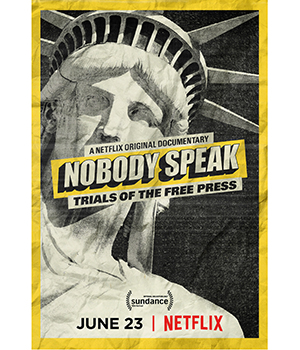Nobody Speak: Trials of the Free Press, which premiered at the 2017 Sundance Film Festival, is screening as part of the Hamptons International Film Festival SummerDocs series on Saturday, July 8 at Guild Hall in East Hampton.
The captivating Netflix original documentary explores the riveting high stakes legal battle between Gawker and Hulk Hogan, who sued the online tabloid after Gawker posted part of a surreptitiously shot sex tape of the professional wrestler. While initially it looked like the battle simply pit privacy rights against the First Amendment, the case took an astonishing turn when it was revealed that Silicon Valley billionaire Peter Thiel was bankrolling Hogan’s lawsuit.
We recently caught up with Nobody Speak: Trials of the Free Press Director Brian Knappenberger to speak about the case, the free press, and more.
When did you originally hear about the Hogan/Gawker case?
BK: I heard about it while it was still in progress, when they were in the courtroom battling. So that’s when I was first interested in it, and then we started making the documentary and really getting interested in the documentary after the $140 million verdict, and the revelation that Peter Thiel was funding Hogan’s case – that’s when the documentary started, but we were interested in it before that.
 |
|
Nobody Speak: Trials of the Free Press is available on Netflix. (Courtesy Photo) |
What stood out about the case?
BK: By itself, the case was fascinating, because it was basically sort of the first time a sex tape case like this had gone to trial and as tabloidy as that seemed, it was also pretty clear that there was some big picture, privacy verses First Amendment issues at stake here. Some far ranging things could be decided. So that’s what I think stood out. When it was revealed that Peter Thiel was backing Hulk Hogan’s case, then it became a whole different kind of story, a story about big money with a grudge affecting our legal systems.
What was your reaction when you learned that it was Peter Thiel who was bankrolling Hogan’s lawsuit?
BK: I was shocked. It was shocking. First of all, the $140 million verdict was shocking and surprised everybody. That was big news, and when you pair that with the requirement for Gawker to put up $50 million right away, that was essentially the death sentence to Gawker. So whatever you thought of the trial, either side, suddenly there was just this staggering conclusion to it. So that was shocking enough, but when you have this Silicon Valley billionaire emerging from the scenes, from the backgrounds, as this funder of Hulk Hogan’s case, with a very different agenda – a kind of hatred for Gawker of his own – then of course, that’s just bizzaro land.
How did you decide who to interview?
BK: We contacted most of the major parties involved, in fact almost everybody. So we got a ton of the Gawker side, we got Hulk Hogan’s lawyer, which was, I think, a really great interview – kind of important interview for the piece, and then I think Hulk Hogan would have done it if the behind the scenes battle was a little less vicious when we asked. I think there was a sense that any word out of place could effect this multi-million dollar settlement. So, we showed him on the stand, but you know we went after everybody. We certainly tried to talk to Peter Thiel. We asked him many times to be in the film.
Were people from Gawker hesitant to be in the film?
BK: A little bit, yeah. I think there was a general tension all around. The battle was so vicious that I think there was a hesitancy all around. Behind the scenes it was not a kind environment. I think people were cautious in that regard. Some people at Gawker wanted to talk to me and then canceled the interviews because I think they were worried legally, but we got quite a bit of access to Gawker.
Nobody Speak also covers the acquisition of the Las Vegas Review-Journal by Sheldon Adelson. Why did you feel that was an important story to include?
BK: I think it’s a parallel to the Gawker case in the sense that Adelson bought that newspaper in secret. All of Peter Thiel’s maneuvering behind the scenes was done in secret – nobody knew that it was Peter Thiel. He had unlimited funds behind the Hogan side, and that wasn’t apparent to anybody, and the real motives behind the case weren’t apparent to anybody. I think that’s what’s disturbing. People have engaged in litigation finance before, for sure, but the secretive aspect of using what is essentially an unlimited supply of money to silence speech that is, I think, similar to Sheldon Adelson’s secretive purchase of the Las Vegas Review-Journal. It’s not that very wealthy individuals haven’t bought papers before, obviously they have, but usually it’s a source of civic pride. People know about it, and you know who it is, so you know what their motivations are, and you know what their business interests are, and you know where to look for potential conflicts. This was done entirely in secret and that’s a very, very different thing. So I think that’s what did it.
The other reason I wanted to include that story is I’m worried about local journalism, you know, local newspapers across the country. There used to be a time in which there were two/three newspapers in any community – healthy competition for stories. That’s a good thing. Most of that is gone now. So, I wanted to get a sense that this wasn’t just a big, sensational story – that this was happening in communities across the United States as well.
How do cases like this impact the free press?
BK: I think there’s a big danger to the free press from billionaires with an axe to grind. Thin skinned billionaires who can’t stand a word of criticism and don’t believe that a free press is important. I think this is a thing we really have to watch, especially now that there’s a billionaire in the Oval Office who has talked about opening up libel laws and who obviously conducts a daily assault on the press. The free press is important, the adversarial press is important. It’s always going to be annoying to people in power, but that’s part of the checks and balances of our system.
After seeing the film, what do you hope people take away?
BK: I hope they have a renewed sense of why journalism is important, even if it’s annoying sometimes, even if it’s a raucous kind of press. I hope people walk away from the film with a renewed sense of why we actually need this. The big question here is: Will we emerge from this with any free press in a meaningful way? So I hope people do that and I hope people support journalism that they like – that they think is doing good work, and I also think we have to stand up for the concept of journalism and why it’s important.
The SummerDocs Nobody Speak: Trials of the Free Press screening will begin at 7 p.m. A conversation with Director Brian Knappenberger and Gawker Founder Elizabeth Spiers will follow. Tickets are $23 to $25. For those not in the Hamptons, Nobody Speak: Trials of the Free Press is now available globally on Netflix.
Guild Hall is located at 158 Main Street in East Hampton. For more information, visit hamptonsfilmfest.org.












